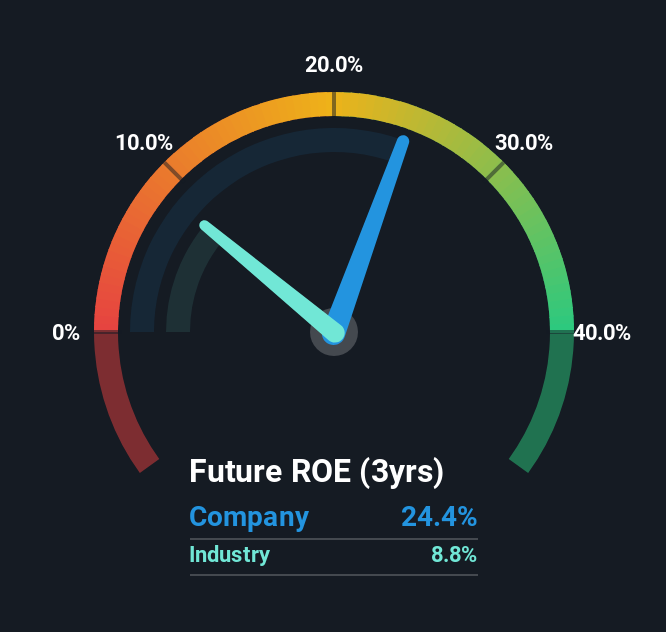One of the best investments we can make is in our own knowledge and skill set. With that in mind, this article will work through how we can use Return On Equity (ROE) to better understand a business. To keep the lesson grounded in practicality, we’ll use ROE to better understand JAPAN Creative Platform Group Co., Ltd. (TSE:7814).
ROE or return on equity is a useful tool to assess how effectively a company can generate returns on the investment it received from its shareholders. Simply put, it is used to assess the profitability of a company in relation to its equity capital.
Trump has pledged to “unleash” American oil and gas and these 15 US stocks have developments that are poised to benefit.
How Is ROE Calculated?
ROE can be calculated by using the formula:
Return on Equity = Net Profit (from continuing operations) ÷ Shareholders’ Equity
So, based on the above formula, the ROE for JAPAN Creative Platform Group is:
24% = JP¥4.2b ÷ JP¥17b (Based on the trailing twelve months to March 2025).
The ‘return’ is the income the business earned over the last year. One way to conceptualize this is that for each ¥1 of shareholders’ capital it has, the company made ¥0.24 in profit.
See our latest analysis for JAPAN Creative Platform Group
Does JAPAN Creative Platform Group Have A Good ROE?
By comparing a company’s ROE with its industry average, we can get a quick measure of how good it is. However, this method is only useful as a rough check, because companies do differ quite a bit within the same industry classification. Pleasingly, JAPAN Creative Platform Group has a superior ROE than the average (8.8%) in the Commercial Services industry.
 TSE:7814 Return on Equity August 14th 2025
TSE:7814 Return on Equity August 14th 2025
That’s clearly a positive. With that said, a high ROE doesn’t always indicate high profitability. Especially when a firm uses high levels of debt to finance its debt which may boost its ROE but the high leverage puts the company at risk. To know the 3 risks we have identified for JAPAN Creative Platform Group visit our risks dashboard for free.
How Does Debt Impact Return On Equity?
Most companies need money — from somewhere — to grow their profits. That cash can come from retained earnings, issuing new shares (equity), or debt. In the first two cases, the ROE will capture this use of capital to grow. In the latter case, the debt required for growth will boost returns, but will not impact the shareholders’ equity. In this manner the use of debt will boost ROE, even though the core economics of the business stay the same.
Combining JAPAN Creative Platform Group’s Debt And Its 24% Return On Equity
JAPAN Creative Platform Group does use a high amount of debt to increase returns. It has a debt to equity ratio of 2.79. Its ROE is pretty impressive but, it would have probably been lower without the use of debt. Debt does bring extra risk, so it’s only really worthwhile when a company generates some decent returns from it.
Conclusion
Return on equity is a useful indicator of the ability of a business to generate profits and return them to shareholders. A company that can achieve a high return on equity without debt could be considered a high quality business. If two companies have around the same level of debt to equity, and one has a higher ROE, I’d generally prefer the one with higher ROE.
But when a business is high quality, the market often bids it up to a price that reflects this. The rate at which profits are likely to grow, relative to the expectations of profit growth reflected in the current price, must be considered, too. Check the past profit growth by JAPAN Creative Platform Group by looking at this visualization of past earnings, revenue and cash flow.
Of course, you might find a fantastic investment by looking elsewhere. So take a peek at this free list of interesting companies.
New: Manage All Your Stock Portfolios in One Place
We’ve created the ultimate portfolio companion for stock investors, and it’s free.
• Connect an unlimited number of Portfolios and see your total in one currency
• Be alerted to new Warning Signs or Risks via email or mobile
• Track the Fair Value of your stocks
Try a Demo Portfolio for Free
Have feedback on this article? Concerned about the content? Get in touch with us directly. Alternatively, email editorial-team (at) simplywallst.com.
This article by Simply Wall St is general in nature. We provide commentary based on historical data and analyst forecasts only using an unbiased methodology and our articles are not intended to be financial advice. It does not constitute a recommendation to buy or sell any stock, and does not take account of your objectives, or your financial situation. We aim to bring you long-term focused analysis driven by fundamental data. Note that our analysis may not factor in the latest price-sensitive company announcements or qualitative material. Simply Wall St has no position in any stocks mentioned.


AloJapan.com